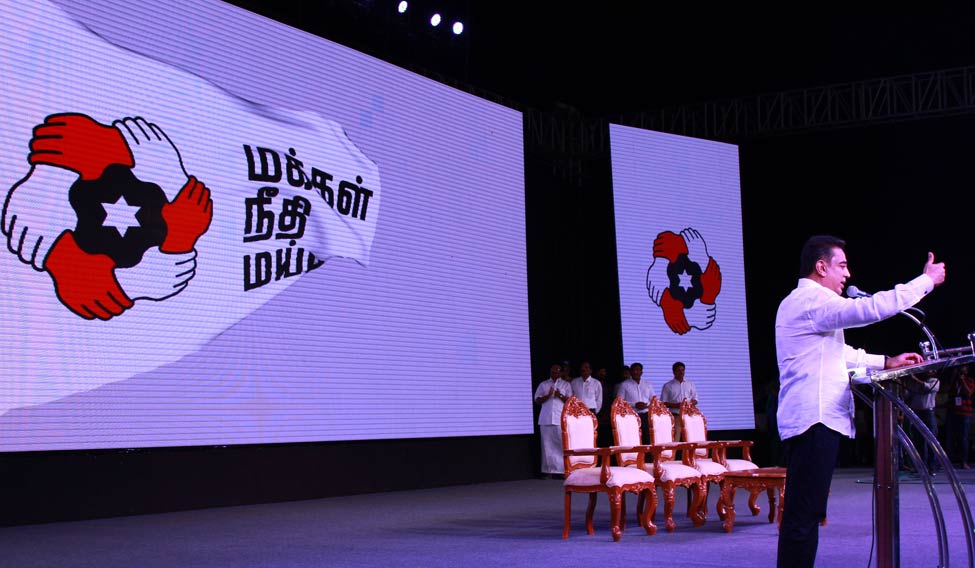Actor Kamal Haasan formally made his political plunge, calling his new party 'Makkal Needhi Maiam', which loosely translates into ‘People Justice Centre.’ His party symbol is six hands, which represents the six states of South India, and a star in the middle, representing the people. Haasan, who calls himself an agent of change, called for bringing a change, while launching the party.
The words ‘Dravida’ or ‘Dravidian’ are kept away from the name of his party. These two words have been a common appendage in the past five decades, after the DMK and then the AIADMK broke away from Periyar’s Social Justice Party. By eschewing ‘Dravidian’ from his party name, it remains to be seen if Haasan will deliver in the near future and be the people’s party as promised.
“I am not your leader. I am your tool,” he told his fans amidst huge applause. Dedicating the party to the people, 'Nammavar' Kamal Haasan tried to strike a chord with the people. “This is a party made for you. This is for the people,” he told his fans.
Before climbing up the well-lit sprawling dais, on the outskirts of Tamil Nadu’s temple town Madurai, Haasan unfurled his party flag, looked up the flying flag and saluted it. Explaining the party symbol of six hands clutching each other, with a star on the centre, against a white background, he said, “Look into it. The six hands represent the six states of south India and the star in the middle is you (people).”
Also Read
- ‘A precursor to saffronising everything’: Stalin slams DD logo change
- Why Tamil Nadu recorded a low voter turnout this Lok Sabha elections
- Makers of Indian 2 release a poster featuring Siddharth on his birthday
- From an aide of Jayalalithaa to a fervent fan of Modi, Nainar Nagendran’s long run in TN politics
- Watch: Amid ‘Mughal mindset’ jab, Rahul Gandhi shares a ‘sweet moment’ with TN CM Stalin
Although Haasan has done away with the Dravidian tag in the name of the party, the flag still has white and red colours which are usually associated with Dravidian parties in the state. AIADMK’s flag is red, white and black with former CM Annadurai in the middle. DMK, MDMK and Vijayakanth’s DMDK too have both the colours.
'Makkal Needhi Maiam' will not fail to remind people of Periyar’s Social Justice Party, which stood for rationalism and social justice for people, the actor-turned-politician noted. The party also reminds of social thinker and Tamil writer M.S. Udhayamurthy’s Makkal Sakthi Iyakkam—a people’s movement which was very popular during the late 80s and early 90s. Udhayamurthy, a US returnee and author of 23 books, including Ennangal (feelings) and Unnal Mudiyum Thambi (you can do it brother), inspired the youth through his writings and motivational speeches. His movement was so popular that the youth in the southern districts and college going students were part of it. In fact Haasan’s movie Unnal Mudiyum Thambi drew inspiration from Udhyamurthy’s writing.
Haasan made it clear that there will be no permanent chief minister for his party like the others and said it will be, “you”, people who will run the show. “My father is his die hard fan and he is part of the movement as a district in-charge. Because my father is his fan I came here. Influenced by my dad I too like him. I like this plank of alternate politics. But it remains to be seen what he will do,” says Pavithra Kumar, who came to hear him at the Othakadai grounds in Madurai.
More than all this, Haasan's speech was just a continuation of what Delhi Chief Minister Arvind Kejriwal had to say, “No corruption and clean politics.” Haasan, taking a cue from Kejriwal’s speech and inspired by his communist friend and Kerala Chief Minister Pinarayi Vijayan, spoke on many issues—“quality education”, “corruption free government” and “honest politics”.
“As Kejriwal said, there is no dearth of money. There is dearth of people who will come along. You come with me we shall prove successful,” he said. However, Haasan’s Q and A, which was humorous with much of sarcasm in it might have been a straight talk, but failed to tell people that he is well informed about various issues. He said, “If we eliminate corruption, we can provide uninterrupted power supply (electricity) to the people. If we have dialogues, we can resolve the contentious Cauvery issue.” These might sound just a showmanship on the stage.
Haasan’s rally resembled that of actor-turned-politician Vijayakanth’s party launch in the same temple town Madurai, in 2005. In 2005, when Karunandhi and Jayalalithaa were very much active, Vijayakanth promised an alternative to the Dravidian parties and set sailing on the anti-corruption plank. He was voted to lead the opposition after he joined hands with the AIADMK. And later when he decided to go at it alone, he only ended up as a spoiler, falling down from being a catalyst.
In fact, in the early 70s, when MGR broke away from the DMK, he wasn't following the Gandhian way or anti-corruption plank, but was merely opposing Karunanidhi. His decision, however, made him lead the state for more than a decade. Jayalalithaa, who claimed MGR's legacy, was always followed him in opposing Karunanidhi.
However, others in the likes of Vaiko, PMK's Ramadoss or Vijayakanth, who tried to offer an alternative to DMK and AIADMK hardly met with success. Haasan’s motto of corruptionless, clean politics can sure give him a head start, but it remains to be seen how long he can take this idea forward.
“He (Haasan) has started it from A.P.J. Abdul Kalam’s place. I was with Kalam and he was a real inspiration of the youth and students. But Kamal fails to be convincing with too many policies and ideologies. He is still not clear on his path,” says V. Ponraj, who was political advisor to Kalam.


